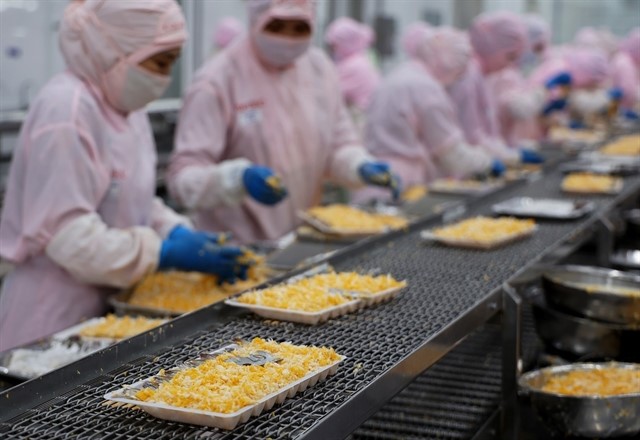Since the EU-Việt Nam Free Trade Agreement (EVFTA) came into effect in August 2020, the European Union (EU) has emerged as a leading trade partner for Việt Nam. Vietnamese businesses could unlock significant opportunities from the EVFTA if they know how to capitalise on its benefits.

Since the EU-Việt Nam Free Trade Agreement (EVFTA) came into effect in August 2020, the European Union (EU) has emerged as a leading trade partner for Việt Nam. Vietnamese businesses could unlock significant opportunities from the EVFTA if they know how to capitalise on its benefits.
That is what delegates heard at a seminar on promoting trade in the European market, focusing on the potential for expanding exports to the European market via official channels held by the Việt Nam Trade Promotion Agency under the Ministry of Industry and Trade (MoIT) on Monday.
Speaking at the event, Đinh Sỹ Minh Lăng, an official from the MoIT’s European-American Market Department, said that data from Việt Nam Customs indicated that in the past four years, Việt Nam’s exports to the EU were estimated to exceed US$200 billion, achieving an annual growth of 12–15 per cent.
In July 2024 alone, Việt Nam recorded a trade surplus of over $20.2 billion with the EU, a 19.4 per cent increase compared to the same period in 2023. Its export turnover grew by approximately 16.8 per cent, while imports rose by around 10 per cent. The EU is now among Việt Nam’s six largest import-export markets.

A survey by the European Chamber of Commerce in Việt Nam (EuroCham) showed that the EVFTA had significantly boosted Việt Nam's exports to the EU, from EUR35 billion ($36.9 billion) in 2019 to over EUR48 billion in 2023. Sectors such as electronics, textiles, footwear, agriculture and seafood had particularly benefitted from the phased tariff reductions under this agreement.
Lăng emphasised that formal export methods were more complex due to stricter documentation and higher taxes and fees, but ensure rigorous quality control. This approach enhanced the reputation of Vietnamese enterprises and products in global markets.
Participation in official channels also allowed businesses to access markets, particularly demanding markets and benefit from state support policies, thereby contributing to sustainable economic growth, he added.
To succeed in exports via official channels, businesses needed to identify target markets, research standards and regulations and assess their own capabilities to develop effective strategies, he suggested.
Moreover, they should adopt suitable standards for their products, build and maintain quality management systems, enhance employee skills, upgrade technology, and focus on producing high-quality goods that satisfy stringent export market demands.
Meanwhile, according to former trade envoy at the Vietnamese Embassy in the UK Nguyễn Cảnh Cường, the UK is one of the world’s largest economies, with a population of over 67 million. British consumers prioritise quality, sustainability and unique value propositions. They are willing to pay a premium for products that meet high-quality standards and demonstrate a commitment to environmental protection.
However, the UK market is governed by stringent technical standards and regulations, particularly in food safety and environmental practices. To succeed in this highly competitive landscape, businesses must be thoroughly prepared to meet these requirements and differentiate themselves effectively.
Cường highlighted the opportunities provided by the UK-Việt Nam Free Trade Agreement (UKVFTA), which eliminates over 99 per cent of tariff lines within six years. Key beneficiaries include seafood, textiles, footwear, furniture and processed agricultural products.
For example, catfish and frozen shrimp are expected to achieve an export turnover of over $30 million in 2024, an increase of more than ten per cent over the previous year. Products made from natural and sustainable fibres are attracting British consumers. Moreover, this is Việt Nam's second largest import market in Europe, with a high demand for modern furniture.
He suggested using digital marketing and artificial intelligence (AI) for entry into the UK market, as well as participating in international trade fairs and collaborating with trade support organisations.
The British Standards Institution (BSI) plays a crucial role in ensuring that products meet the technical, legal and commercial requirements of the UK market. Products that adhere to BSI standards are highly regarded for their quality and safety, making them more likely to gain the trust of British importers and consumers. By meeting these standards, businesses also reduce the risk of their products being rejected at customs for failing to comply with technical or safety regulations.
Moreover, BSI certifications are widely recognised, which can facilitate access not only to the UK market but also to the broader European market.
He also advised businesses to align products with British consumer preferences by using recyclable and biodegradable materials, providing clear information on product composition and origin and choosing neutral colours for packaging.
Nguyễn Thành Hưng, a senior advisor to the Government, stressed the importance of minimising risks in cross-border transactions. Accordingly, businesses should verify information, proactively validate broker-supplied information through official channels such as industry associations or Vietnamese diplomatic missions in the buyer’s country.
Companies should engage directly with partners to avoid over-reliance on intermediaries, he said, adding in any transactions, they must draft contracts with clear and comprehensive terms to tightly bind all parties involved.
By adopting these strategies, Vietnamese firms could enhance their competitive edge in the European market while navigating the complexities of formal export processes, he said. — VNS
- Tags
- exports to EU
- EVFTA
- UKVFTA





